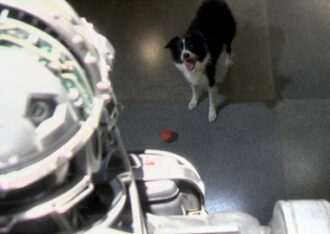
Capricology: Divine Madness
This week’s episode asks big questions about psychology and religion, and reminds us that a dog is a robot’s best friend.
Read More
This week’s episode asks big questions about psychology and religion, and reminds us that a dog is a robot’s best friend.
Read More
Welcome to the first installment of our ongoing coverage of television’s latest contribution to the cultural intersection of science and religion, with bonus themes to include: the body, artificial intelligence, paganism, original sin, immigration, and race. Join Diane Winston, Anthea Butler, Salman Hameed, and Henry Jenkins every week as they delve into deep exegesis of Caprica.
Read More
In the ever more dystopian world of Syfy Channel’s Caprica, teenage girls inhabit robot bodies, or live eternally without bodies at all, human bodies are marked by memories, and all the while there is blood flowing in the virtual streets.
Read More
Tamara, the girl who is dead but doesn’t know it, who exists only within the “magic circle” of a virtual game, takes center stage in this week’s episode, and in our commentary.
Read More
Among other clues to this sci-fi opera, our Caprica watchers took particular note of a bobbleheaded bull on the dashboard of a Tauron killer. What can we learn from the possibility that Capricans can be as kitsch-obsessed, cigarette-addicted, and as reckless with civil liberties as earthlings can be?
Read More
More on the sci-fi TV show that imagines monotheists rebelling against a polytheist society, speculates about the nature of the human soul, and asks, “Can you be free if you’re not real?”
Read More
Can a mechanical body have a personality? How about multiple personalities? Caprica asks these tried and true sci-fi questions, but then takes a leap into questions of terrorism—and sexual identity.
Read More
How did reviewers from the New York Times to Christianity Today miss the obvious religious references in this Oscar-nominated hit? Did they blink and reach for popcorn at the images of a tattooed Jesus Christ on Randy’s back, or was it more about the myth of modern individualism and body-soul dualism?
Read More
A Jewish theological take on the transhumanist movement…
Read More